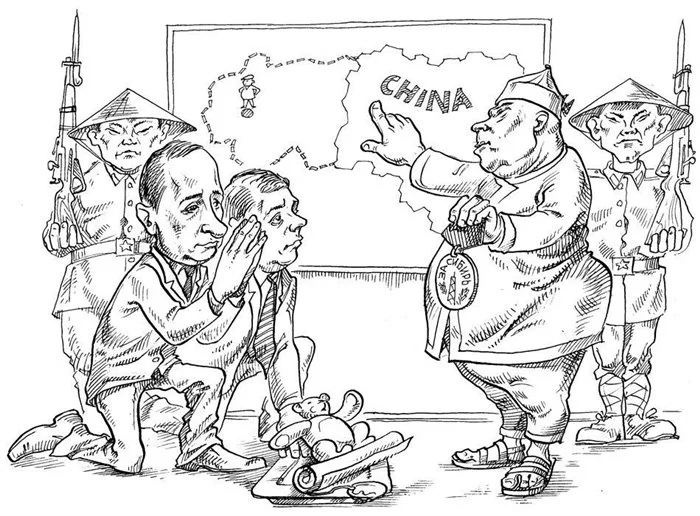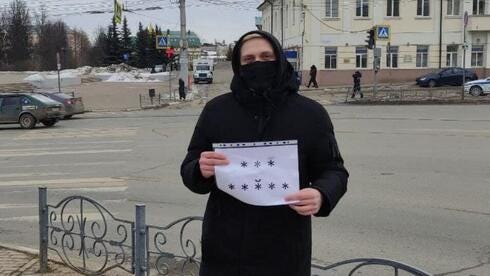No peace in mind
We are young and capable!
Putin will help everyone
China and sanctions
Business doesn’t like defaults
No way to find oil
Revenge and history
Blocking opportunities
Not a pleasant read but must
No hint allowed
No peace in mind
As part of the negotiations, Russia handed Ukraine a draft final document with precise formulations and is awaiting a response, Russian presidential spokesman Dmitry Peskov said.
At the moment, our draft document, which includes absolutely clear elaborated wording, has been handed over to the Ukrainian side. The ball is on their side; we are waiting for an answer.
An adviser to the head of the Ukrainian presidential office, Mikhail Podolyak, confirmed receipt of such a document, noting that it responds to Ukraine’s written position, which was given to the Russian delegation at the March 29 talks in Istanbul.
Such slowness on the part of Russia confirms Vladimir Putin’s unwillingness to move to end (or reduce) military action. The Russian leader still aims, at the very least, to gain control of the entire territory of the Donetsk and Luhansk regions, as he once again stated today.
We will act consistently. We will achieve a situation in which life will gradually normalize there [in Donbas] as well; it will change for the better... First, the goal of this operation is to help people, to help our people who live in Donbas.
I feel that Putin himself no longer understands how to treat the self-proclaimed republics: Either as independent, but then why “Our people”? Or as part of Russia, in which case one must wait for the decision to annex the LNR/DNR, like the Crimea?
We are young and capable!
In October, Vladimir Putin will be 70 years old, and he feels awake and energetic, capable of working for many more years. But if he can continue to work, why does Russia have a law on the age limit for officials who must step down from their positions at 65?—he thought.
Said, done. A year ago, a law was passed that removes the age limit for officials appointed by the President. Next month, the State Duma will consider a bill drafted by the government to raise the age limit for deputy ministers and heads of government agencies to 70.
Putin will help everyone
Vladimir Putin explains his vision of how Russia’s economy will adapt to the new reality, and the recipe is the same: The state will help you. Today he assured his listeners that 1) Replacing cafés and restaurants owned by foreign companies with companies created by Russians will lead to better service, 2) Russian fashion designers will replace Western brands, and 3) The drop in Russian metal exports will be significantly offset by an increase in domestic demand, including from the government.
Many (café and restaurant owners) claim they are leaving our market... if they do leave, it will help to create opportunities and free up this market for domestic companies ... I am 100% confident that replacing foreign owners and manufacturers (with Russian ones) will lead to better service for our citizens.
[The clothing design business] absolutely can and should be successful in import substitution. Of course, we need more attention, time and money, and more support from the state to create appropriate materials, fabrics, equipment... And if someone leaves our market, then, of course, the place is not empty. And I would very much like domestic producers and designers to take this place. We will help.
It is necessary to support and stimulate [domestic demand for metal], primarily by increasing the volume of housing, infrastructure, commercial and industrial construction, by widely producing goods that use metallurgical products... It is necessary to launch long-term projects and programs, the effect of which will be felt for the entire economy, for the Russian regions and residents.
China and sanctions
Once again, China has demonstrated that deeds are much more important than words in today’s world. While Chinese leaders support (I would even say, encourage) Putin to continue his confrontation with the West, which leads to increased sanctions pressure on Russia and weakens its economy, and continue to say that there is no place for sanctions in the modern world, Chinese companies take the opposite position, de facto complying with sanctions restrictions.
After Visa and Mastercard stopped cooperating with Russian banks, the latter hoped that China’s UnionPay payment system could replace them. However, it has become known that UnionPay has not discussed the issuance of its bonds by sanctioned Russian banks, including the two largest state-controlled banks, Sberbank and VTB. UnionPay did not make any statement about this and stopped talks without explanation; Russian bankers said the company feared secondary sanctions.
As the former Russian prime minister Victor Chernomyrdin said once: It never happened before, and now it’s happening again.
Business doesn’t like defaults
Large Russian companies, which have been actively borrowing money on international markets and whose revenues allow them to service and repay debts, have stated their reluctance to use the possibility of repaying loans in rubles, as the Ministry of Finance has done.
The Russian Union of Industrialists and Entrepreneurs sent a letter to Prime Minister Mikhail Mishustin with proposals to discuss alternative options for servicing debts. Businessmen are confident that the use of the scheme proposed by the Ministry of Finance will result in defaults, after which bondholders will be able to go to court and demand that security seizures be applied to Russian companies’ revenues received abroad, and to their assets. “And practice shows that the value of assets subject to a security seizure is often significantly higher than the disputed amount,” said RSPP President Alexander Shokhin.
All the variants proposed by the RUIE envisage negotiations with the bondholders and obtain their consent to change repayment terms. Such procedures may take many months. Shokhin said that Russian business has no goal to “bypass” foreign holders of securities. “We are talking about such options for servicing the debt obligations of Russian issuers that, on the one hand, should proceed from the need to take into account the content of the prospectuses of specific Eurobond issues and, on the other hand, ensure payments to bondholders, regardless of sanctions.”
In the dry-up, the businessmen asked the government to issue permits to all companies that had placed Eurobonds to purchase currency and continue servicing debts following the terms of their placement.
No way to find oil
Continued sanctions pressure for several years could lead to a halt in an offshore exploration of hydrocarbons, according to the management of the state company Rosgeologiya. The sanctions imposed include a ban on supplying Russian companies with equipment for geological exploration and offshore production.
Rosgeologiya owns 18 ships, of which 11 were imported. The average age of the vessels exceeds 35 years; nine of them were built back in the 1970s and are obsolete. The inter-repair period is 2.5 years, and the lack of spare parts, which will not be supplied because of sanctions, will stop the operation of the entire fleet.
After the imposition of sanctions in 2014, this problem became evident when some Western suppliers stopped supplying spare parts. The Ministry of Industry then developed an import substitution plan for seismic exploration on the shelf, but it did not go beyond the development of prototypes. Rosgeologiya is dependent on 1,100 items, primarily imported components for domestic equipment and foreign software. According to the company, the share of Russian software for exploration is 6%.
Revenge and history
A week ago, Maksim Reznik, a former deputy of the St. Petersburg Legislative Assembly, won a court case against the Investigative Committee of Russia for not being allowed to participate in the elections. He proved that the investigators had violated his constitutional rights by preventing him from participating in the election campaign in the summer of 2021.
Today, the investigators got their revenge: The court found Maksim Reznik guilty of illegal possession of drugs. He was arrested on this charge in March 2021, six months before the elections for the City Parliament, and has been under house arrest ever since. This became an obstacle to his participation in the elections: The politician was deprived of the possibility of collecting the necessary documents. The court sentenced the politician to five months of imprisonment to be served in the colony settlement; however, the court set off the time Reznik was under house arrest and acknowledged the sentence served.
Drug charges are the most common in Russia—one-third of the incarcerated have been convicted of drug possession—and often, the police plant drugs during arrests to meet crime-solving goals. The fictitious nature of Reznik’s charge demonstrates the leniency of the punishment: A conviction with terms of imprisonment that allow the defendant to be released right after the trial ends is a kind of admission by judges that the investigators were unable to prove guilt.
Maksim Reznik’s case will undoubtedly go down in history: The first time a Russian court has acknowledged that law enforcement agencies are used in Russia to limit political competition.
Blocking opportunities
“Russian Railways” is concerned that Chinese companies are starting to build alternative routes to deliver containers to Europe, bypassing Russian territory, said Alexei Shilo, Russian Railways Deputy CEO.
...We see an inevitable revival of various alternative routes to bypass Russia. These are statements and figures which we officially see. At least for the first two months, almost 3,000 containers have been moved along TRACECA (Transport Corridor Europe-Caucasus-Asia) across the Caspian Sea, Azerbaijan, and Georgia. It is not much, but our colleagues obviously expect the result to be higher than last year this year. If they build up standard logistics there—at these prices, I think, it will be quite an affordable route—we can get part of the volume bypassing our country.
Shilo said that Russian Railways is taking specific “countermeasures.”
…we are now actively loading the Samur border crossing to load Azerbaijan’s infrastructure, including Russian cargoes in transit, Azerbaijani, Iranian, and all other directions, so that there would be fewer opportunities for different cargoes. We believe that such a strategy is probably the right one from our side.
Not a pleasant read but must
Journalists from the Meduza and Astra projects reconstructed the events of March 8-29, when Russian troops were stationed in the Ukrainian village of Bogdanovka (45 kilometers from the center of Kyiv). Not a pleasant read, which shows that the events in Bucha were not an accident. Read here. (GoogleTranslate will help)
No hint allowed
On March 12, Ivanovo resident Mikhail Gusev stood on the street with a piece of paper with eight asterisks: *** *****. The Russian was detained for this, charging him with “discrediting the Russian army.”
Ivanovo police said that the printed six-pointed star * “is associated with military themes for most citizens” because Wikipedia says that the five-pointed star “is an important ideological symbol around the world” and “was used by the Red Army.” In addition, from the police point of view, “an appeal of ‘NO WAR’ (Нет войне) (the symbolism is like the image on the poster) is standard on the internet, indicating a negative attitude toward the military operation conducted outside of the Russian Federation.”








Hello Sergey
What can you tell us about the influence of Aleksander Dugin on Putin and his inner circle?